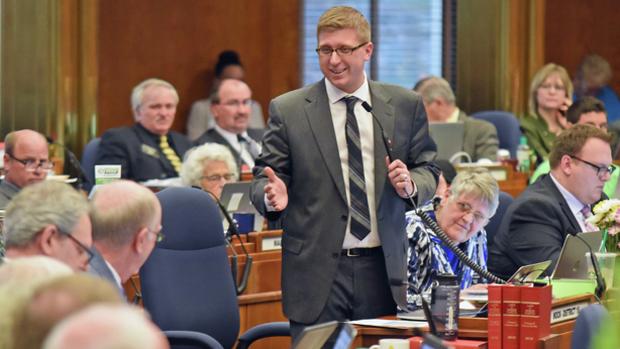Democrats Aren’t Being Honest When They Talk About North Dakota’s Budget Situation

TOM STROMME/Tribune North Dakota House minority leader Rep. Corey Mock (D-Grand Forks) speaks on SB 2273, a bill dealing with senior citizen services and programs fund during Thursday afternoon's floor session.
I’ve been pretty blunt in recent weeks talking about Republican handling of North Dakota’s budget situation.
I think Republicans bungled. They spent too much. They built big budget increases on the back of unsustainable revenues driven by a boom in commodity prices. They have nobody to blame for that but themselves.
I’ve also written, consistently, that North Dakota’s Democrats have an opportunity to turn that bungling into electoral gains. Only, as is so often the case with the Democrats in our state, they’re going to let gross incompetence and allegiance to certain progressive dogmas get in their way.
Case in point, this press release just put out by Democrats responding to the outcomes from the legislative session which was just completed last week. The whole thing is worth a read, but these comments from House Minority Leader Corey Mock in particular are just remarkable (emphasis mine):
At the beginning of the legislative session, lawmakers from both parties confronted a budget shortfall of $1.5 billion. This shortfall was in part the result of low commodity prices and a sagging economy. But it was also the result of excessive spending over the last several sessions and ill-advised tax cuts that sacrificed much of North Dakota’s revenue to benefit corporations and oil companies. In fact, the cost of the corporate income tax cuts and oil extraction tax cuts passed by the Republican majority amounted to one-third of the budget shortfall we faced.
I’ve actually attempted to book Rep. Mock for an interview on my radio show this week, but so far he’s not responding to my calls or emails or texts or social media messages. Maybe because he’s afraid I’ll want to talk about these comments he’s made, which are utterly indefensible on any sort of a factual basis.
For one thing, Mock doesn’t mention the cuts to personal income taxes. Because advocating for higher taxes on individuals wouldn’t be politic, I guess. There are apparently limits to what even the liberals will praise when it comes to higher taxes.
For another, how much of the decline in corporate income tax revenues is due to the cuts passed (which were actually quite modest) and how much is simply because the amount of economic activity in our state fell after the oil boom? It would be nice if the Democrats showed their work before throwing around talking points, because the latter factor almost certainly had more impact than the former.
But the biggie here is a Democrat, once again, trying to mislead the public about oil tax collections. I’ve written about this issue a lot here on the blog, but that’s because this baloney is worth calling out every single time it’s brought up.
Mock refers to “oil extraction tax cuts” contributing to “one third of the budget shortfall” addressed in the recently completed legislative session. But how can that be? As a result of the change in the oil extraction tax Mock refers to, the oil companies have paid hundreds of millions of dollars more than they would have.
From January 2016, when the new policy went into effect, through February of this year oil companies have made nearly $600 million in additional taxes according to numbers from the Office of the Tax Commissioner:
Mock calls this a tax cut, but the result of the policy as enacted was hundreds of millions of dollars in additional revenue.
You can’t call something a “tax cut” when it results in the people paying the tax shelling out more money to the government.
Now, the argument Democrats are making is that it’s a tax cut because the top extraction tax rate was lowered by one percent, but the tax code is more complicated than that. It was, at the time it was changed, not simply a rate. It was also exemptions from the tax triggered by certain price points. The legislature lowered the rate, yes, but they also eliminated the exemption.
The net result for the oil industry, from January of last through through present, has been higher taxes.
That’s a massive tax increase.
Democrats think it should have been an even larger tax hike – they wanted to leave the top rate alone – and that’s fine. That’s their opinion. It’s not one most North Dakotans support, but whatever. A higher rate would have produced even more revenue.
But what they don’t get to do is refer to this change in policy as a tax cut. Not when tax burdens went up.
They don’t get to say this change in policy contributed to the state’s budget shortfall when, in reality, it resulted in hundreds of millions of dollars in additional revenues.
When they do these things they’re lying.
That’s the only accurate term for it.





